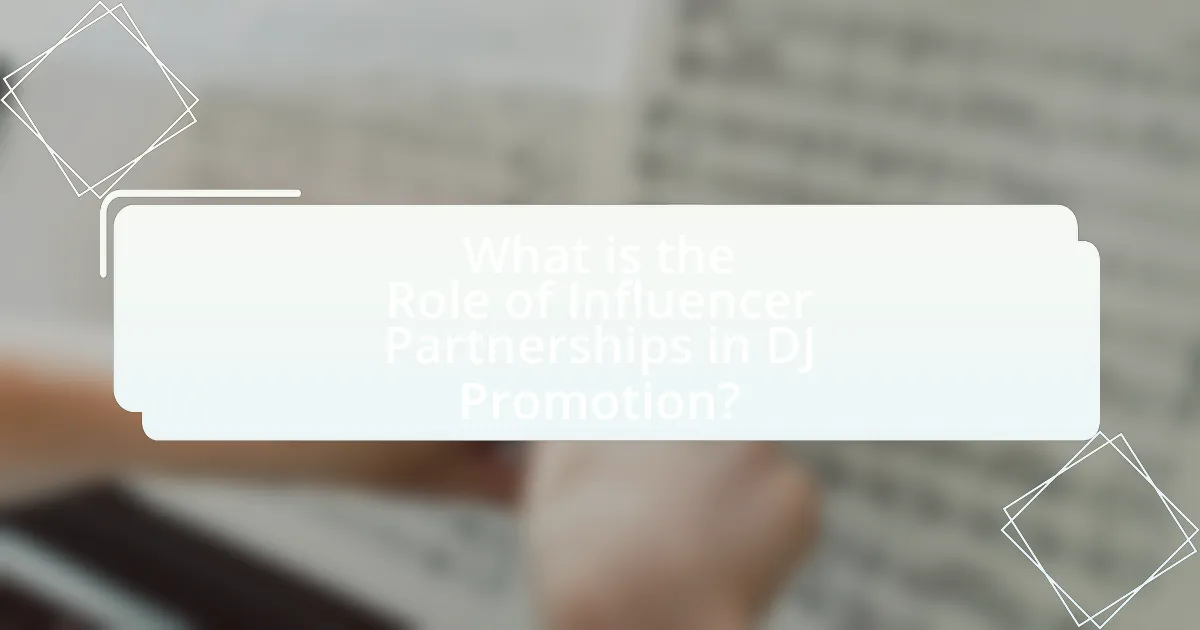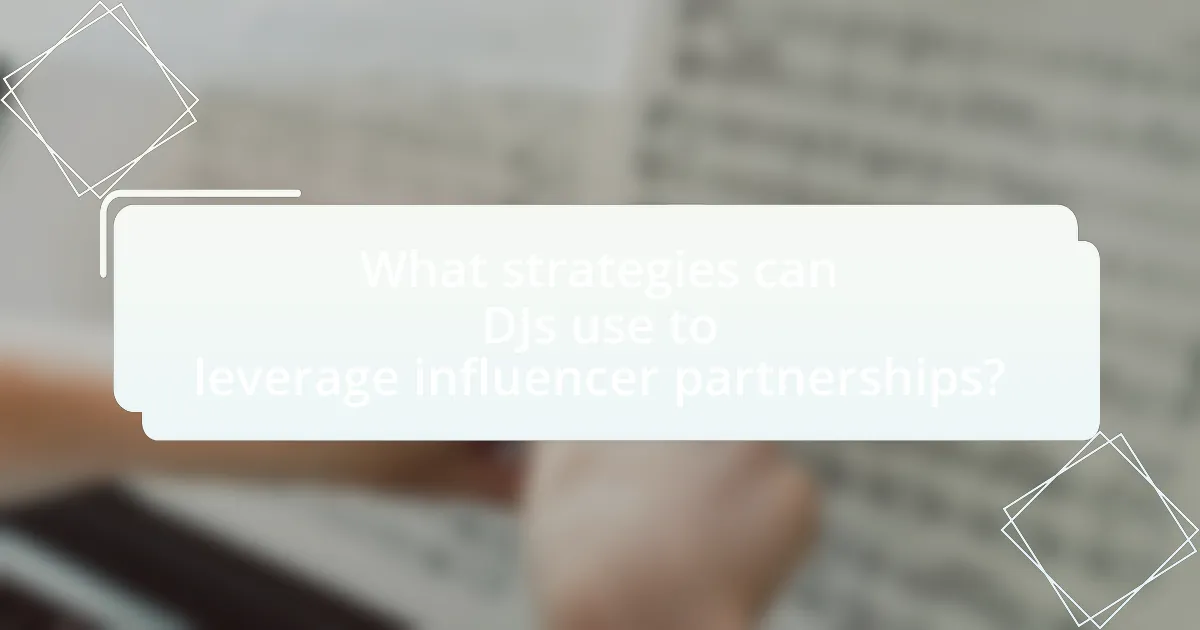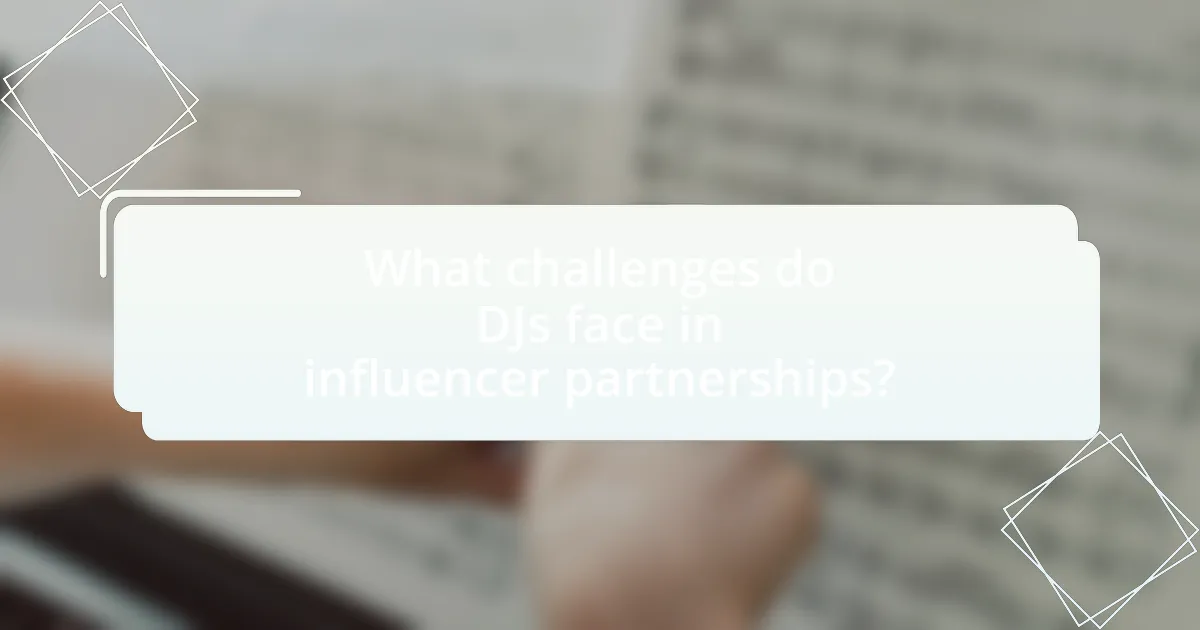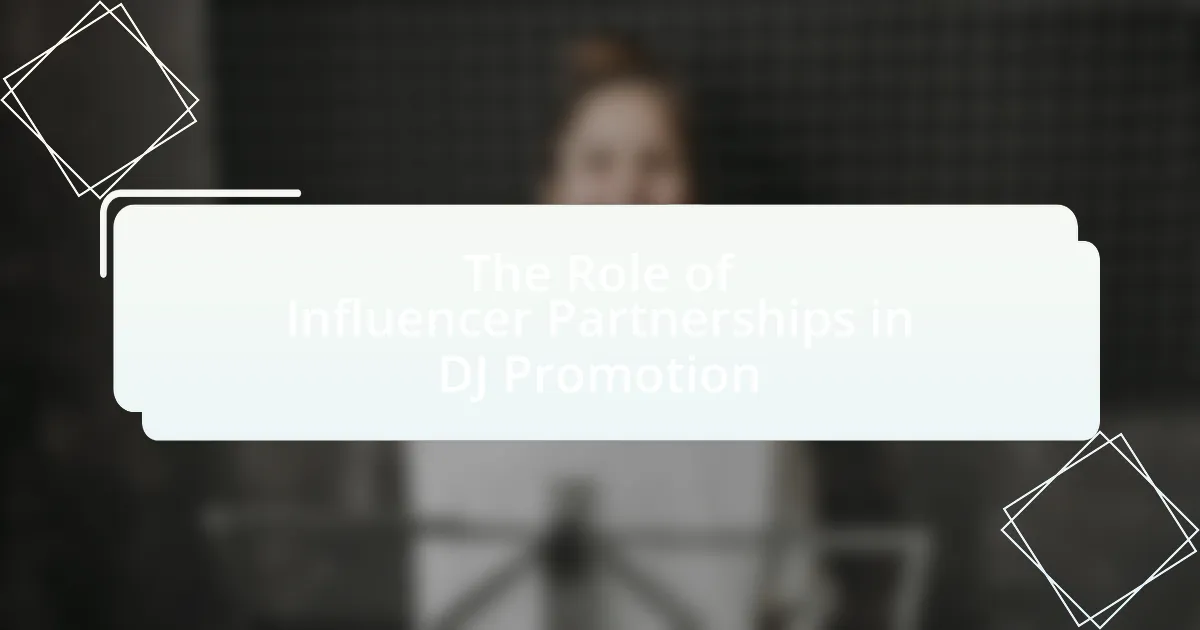The article focuses on the role of influencer partnerships in DJ promotion, highlighting how these collaborations enhance visibility and engagement for DJs. It discusses the effectiveness of platforms like Instagram and TikTok for reaching new audiences, the criteria influencers use to select DJs, and the types of content that can be created together. Additionally, the article addresses the challenges DJs face in these partnerships, strategies for overcoming obstacles, and best practices for building successful, long-term relationships with influencers. Key metrics for measuring the success of these collaborations are also outlined, emphasizing the importance of authenticity and alignment in influencer partnerships.

What is the Role of Influencer Partnerships in DJ Promotion?
Influencer partnerships play a crucial role in DJ promotion by leveraging the influencer’s audience to enhance visibility and reach. DJs collaborate with influencers to tap into their established follower base, which can lead to increased awareness of their music, events, and brand. For instance, a study by the Digital Marketing Institute found that 49% of consumers depend on influencer recommendations when making purchasing decisions, highlighting the effectiveness of influencer marketing. By aligning with influencers who resonate with their target demographic, DJs can create authentic connections and drive engagement, ultimately leading to higher attendance at events and increased streaming of their music.
How do influencer partnerships enhance DJ visibility?
Influencer partnerships enhance DJ visibility by leveraging the influencer’s established audience to promote the DJ’s brand and music. When a DJ collaborates with an influencer, they gain access to a wider and often more engaged audience, which can lead to increased followers, streams, and bookings. For instance, a study by the Digital Marketing Institute found that influencer marketing can yield an ROI of up to 11 times the initial investment, demonstrating its effectiveness in reaching new fans. Additionally, influencers often create authentic content that resonates with their followers, making the DJ’s music more relatable and increasing the likelihood of audience engagement.
What platforms are most effective for DJ influencer partnerships?
Instagram and TikTok are the most effective platforms for DJ influencer partnerships. These platforms have a high engagement rate and a visually-driven format that allows DJs to showcase their music and performances effectively. According to a 2022 report by Hootsuite, Instagram has over 1 billion monthly active users, making it a prime space for influencers to connect with audiences. TikTok, with its rapid growth and viral content potential, has become a key platform for music discovery, with 67% of users stating they discover new music on the app. This combination of user engagement and music-centric content makes Instagram and TikTok the top choices for DJ influencer partnerships.
How do influencers select DJs to promote?
Influencers select DJs to promote based on factors such as audience alignment, music genre relevance, and engagement metrics. They assess whether the DJ’s style resonates with their followers and if the DJ has a strong online presence, including social media following and interaction rates. Additionally, influencers often consider the DJ’s past collaborations and reputation within the industry, ensuring that the partnership will enhance their credibility and appeal. This strategic selection process is crucial for maximizing the effectiveness of promotional efforts and ensuring that the content resonates with both the influencer’s and the DJ’s audiences.
Why are influencer partnerships important for DJs?
Influencer partnerships are important for DJs because they enhance visibility and credibility within the music industry. By collaborating with influencers who have established audiences, DJs can reach new fans and promote their music more effectively. For instance, a study by Nielsen found that 92% of consumers trust recommendations from individuals over brands, highlighting the power of influencer endorsements. This trust translates into increased engagement and attendance at events, as influencers can sway their followers’ opinions and drive them to support the DJ’s work.
What advantages do DJs gain from collaborating with influencers?
DJs gain increased visibility and access to new audiences by collaborating with influencers. This partnership allows DJs to leverage the influencer’s established follower base, which can lead to greater exposure for their music and events. For instance, when a DJ collaborates with a popular social media influencer, the influencer’s posts can reach thousands or even millions of potential fans, significantly amplifying the DJ’s promotional efforts. Additionally, influencers often create engaging content that showcases the DJ’s work, enhancing the DJ’s brand image and credibility within the music industry.
How do influencer partnerships impact audience engagement for DJs?
Influencer partnerships significantly enhance audience engagement for DJs by leveraging the influencer’s established follower base to reach new listeners. When DJs collaborate with influencers, they gain access to a wider audience that may not have been previously aware of their music or brand. This strategy often results in increased social media interactions, such as likes, shares, and comments, as influencers promote the DJ’s work through their platforms. For instance, a study by the Digital Marketing Institute found that influencer marketing can yield an engagement rate of up to 11 times higher than traditional forms of digital marketing. This statistic underscores the effectiveness of influencer partnerships in driving audience engagement for DJs.

What strategies can DJs use to leverage influencer partnerships?
DJs can leverage influencer partnerships by collaborating with influencers to promote their music and events through social media platforms. This strategy allows DJs to tap into the influencer’s established audience, increasing their reach and visibility. For instance, DJs can create exclusive content, such as behind-the-scenes footage or live-streamed performances, which influencers can share with their followers, generating buzz and engagement. Additionally, DJs can offer influencers incentives, such as free tickets or VIP experiences, to encourage them to promote their brand authentically. According to a study by Influencer Marketing Hub, businesses earn an average of $5.78 for every dollar spent on influencer marketing, highlighting the effectiveness of this approach in driving audience engagement and sales.
How can DJs identify the right influencers for their brand?
DJs can identify the right influencers for their brand by analyzing the influencer’s audience demographics, engagement rates, and alignment with the DJ’s musical style and values. This process involves researching influencers who have a following that matches the DJ’s target audience, ensuring that the influencer’s content resonates with the DJ’s brand identity. For instance, a DJ specializing in electronic music should seek influencers who are active in the electronic music scene and have followers interested in that genre. Additionally, tools like social media analytics platforms can provide insights into an influencer’s reach and engagement, helping DJs make informed decisions.
What criteria should DJs consider when choosing influencers?
DJs should consider the influencer’s audience alignment when choosing influencers. This means evaluating whether the influencer’s followers match the DJ’s target demographic, as a relevant audience increases the likelihood of engagement and conversion. Additionally, DJs should assess the influencer’s engagement rate, which indicates how actively their audience interacts with content, as higher engagement often leads to more effective promotion. The influencer’s authenticity and reputation in the music scene are also crucial; influencers with a genuine connection to the genre can enhance credibility and trust. Lastly, the influencer’s content style should resonate with the DJ’s brand image, ensuring a cohesive promotional strategy.
How can DJs assess an influencer’s audience alignment?
DJs can assess an influencer’s audience alignment by analyzing demographic data, engagement metrics, and content relevance. Demographic data includes age, location, and interests of the influencer’s followers, which should match the DJ’s target audience. Engagement metrics, such as likes, shares, and comments, indicate how actively the audience interacts with the influencer’s content, reflecting their genuine interest. Additionally, the relevance of the influencer’s content to the DJ’s music style and brand is crucial; a strong thematic connection enhances the likelihood of effective audience alignment. For instance, a DJ promoting electronic music should collaborate with influencers whose followers are predominantly interested in electronic genres, ensuring a higher potential for audience crossover.
What types of content can DJs create with influencers?
DJs can create various types of content with influencers, including collaborative music tracks, promotional videos, social media challenges, live-streamed performances, and behind-the-scenes content. Collaborative music tracks allow DJs to leverage the influencer’s audience while showcasing their musical style. Promotional videos can highlight upcoming events or releases, utilizing the influencer’s reach to generate buzz. Social media challenges, such as dance challenges set to the DJ’s music, engage both the DJ’s and influencer’s followers. Live-streamed performances can feature the influencer as a host or participant, attracting a larger audience. Behind-the-scenes content provides fans with an intimate look at the DJ’s creative process, further engaging the influencer’s audience. These content types effectively enhance visibility and engagement for both DJs and influencers.
How can DJs use live streams and social media takeovers effectively?
DJs can use live streams and social media takeovers effectively by engaging their audience in real-time and collaborating with influencers to expand their reach. Live streaming allows DJs to showcase their performances, interact with fans through comments, and create a sense of community, which can lead to increased loyalty and follower growth. For instance, platforms like Instagram Live and Twitch have seen DJs attract thousands of viewers during live sets, demonstrating the potential for audience engagement.
Social media takeovers, where DJs temporarily manage an influencer’s account, can introduce their music to new audiences and leverage the influencer’s established fan base. This strategy has been successfully employed by various artists, resulting in increased visibility and follower counts. For example, when a DJ takes over a popular influencer’s account, they can share exclusive content, behind-the-scenes footage, and personal interactions, which can significantly enhance their promotional efforts.
Overall, the combination of live streaming and influencer partnerships allows DJs to create dynamic content that resonates with fans, ultimately driving their promotional success.
What role do promotional giveaways play in influencer partnerships?
Promotional giveaways serve as a strategic tool in influencer partnerships by enhancing brand visibility and engagement. These giveaways incentivize followers to participate, thereby increasing the reach of the influencer’s content and the brand’s message. For instance, a study by the Digital Marketing Institute found that 79% of consumers are more likely to engage with a brand after participating in a giveaway. This engagement can lead to increased follower counts, higher interaction rates, and ultimately, improved sales for the brand involved in the partnership.

What challenges do DJs face in influencer partnerships?
DJs face several challenges in influencer partnerships, primarily including misalignment of brand values, audience mismatch, and contractual complexities. Misalignment occurs when the influencer’s image or messaging does not resonate with the DJ’s brand, potentially alienating fans. Audience mismatch can lead to ineffective promotions, as the influencer’s followers may not be interested in the DJ’s music or events, resulting in low engagement. Additionally, contractual complexities often arise from unclear terms regarding compensation, deliverables, and timelines, which can lead to disputes and hinder collaboration. These challenges highlight the importance of strategic alignment and clear communication in influencer partnerships for DJs.
How can DJs overcome common obstacles in influencer collaborations?
DJs can overcome common obstacles in influencer collaborations by establishing clear communication and setting mutual expectations from the outset. Effective communication helps to align goals, ensuring that both the DJ and the influencer understand their roles and the desired outcomes of the partnership. For instance, a study by Influencer Marketing Hub indicates that 65% of successful collaborations stem from well-defined objectives and open dialogue. Additionally, DJs should leverage data analytics to identify influencers whose audience demographics match their target market, thereby enhancing the relevance and impact of the collaboration. This strategic approach not only mitigates misunderstandings but also maximizes the potential for successful promotional outcomes.
What are the risks of influencer partnerships for DJs?
The risks of influencer partnerships for DJs include potential damage to reputation, misalignment of brand values, and financial loss. DJs may face reputational harm if an influencer engages in controversial behavior, which can reflect poorly on the DJ’s image. Additionally, if the influencer’s audience does not align with the DJ’s target demographic, the partnership may fail to generate meaningful engagement or sales, leading to wasted resources. Financially, if a DJ invests heavily in a partnership that does not yield a return, it can result in significant losses. These risks highlight the importance of careful selection and management of influencer collaborations.
How can DJs ensure authenticity in their influencer partnerships?
DJs can ensure authenticity in their influencer partnerships by selecting influencers whose values and audience align closely with their own brand. This alignment fosters genuine connections, as seen in successful collaborations where both parties share a common vision, leading to increased engagement and trust among followers. For instance, a study by the Digital Marketing Institute found that 70% of consumers are more likely to trust a brand when it partners with an influencer who genuinely uses and endorses its products. By prioritizing these authentic relationships, DJs can enhance their credibility and strengthen their promotional efforts.
What metrics should DJs track to measure the success of influencer partnerships?
DJs should track engagement metrics, reach, conversion rates, and return on investment (ROI) to measure the success of influencer partnerships. Engagement metrics, such as likes, shares, and comments, indicate how well the audience interacts with the content shared by influencers. Reach measures the total number of unique users who see the content, providing insight into the potential audience size. Conversion rates track the percentage of users who take a desired action, such as purchasing tickets or streaming music, directly linked to the influencer’s promotion. Finally, ROI quantifies the financial return generated from the partnership relative to the costs incurred, allowing DJs to assess the overall effectiveness of the collaboration. These metrics collectively provide a comprehensive view of the impact of influencer partnerships on a DJ’s promotional efforts.
How can DJs evaluate engagement and reach from influencer campaigns?
DJs can evaluate engagement and reach from influencer campaigns by analyzing metrics such as likes, shares, comments, and follower growth on social media platforms. These metrics provide quantitative data that reflects audience interaction and the overall impact of the campaign. For instance, a study by Hootsuite found that posts with higher engagement rates typically lead to increased brand awareness and audience reach, indicating the effectiveness of influencer partnerships. Additionally, tracking referral traffic to music streaming platforms or ticket sales can further quantify the campaign’s success, demonstrating a direct correlation between influencer activity and audience engagement.
What tools can DJs use to analyze the effectiveness of their partnerships?
DJs can use analytics platforms such as Google Analytics, social media insights tools, and customer relationship management (CRM) software to analyze the effectiveness of their partnerships. Google Analytics allows DJs to track website traffic and user behavior, providing insights into how partnerships drive engagement and conversions. Social media insights tools, like Facebook Insights and Instagram Analytics, offer data on audience reach, engagement rates, and demographic information, helping DJs assess the impact of influencer collaborations. CRM software enables DJs to manage and analyze customer interactions and data throughout the partnership lifecycle, facilitating better decision-making based on partnership performance metrics.
What best practices should DJs follow for successful influencer partnerships?
DJs should prioritize authenticity and alignment with influencers for successful partnerships. Authenticity ensures that the influencer genuinely connects with the DJ’s music and brand, which resonates with their audience. For instance, a study by the Digital Marketing Institute found that 92% of consumers trust recommendations from individuals over brands, highlighting the importance of genuine endorsements. Additionally, DJs should establish clear communication and set mutual goals with influencers to ensure that both parties benefit from the partnership. This approach fosters collaboration and maximizes reach, as evidenced by successful campaigns where DJs and influencers co-created content that engaged their combined audiences effectively.
How can DJs build long-term relationships with influencers?
DJs can build long-term relationships with influencers by consistently engaging with them through collaboration, mutual promotion, and authentic communication. By collaborating on projects such as music releases, events, or social media campaigns, DJs can create shared value that benefits both parties. Mutual promotion, where DJs and influencers support each other’s content, enhances visibility and fosters a sense of partnership. Authentic communication, including personalized messages and genuine interest in the influencer’s work, strengthens the relationship over time. Research indicates that 70% of marketers find influencer partnerships effective for brand loyalty, highlighting the importance of sustained engagement in building these relationships.
What are the key elements of a successful influencer partnership agreement?
The key elements of a successful influencer partnership agreement include clear objectives, defined deliverables, compensation structure, timelines, and performance metrics. Clear objectives ensure both parties understand the goals of the partnership, such as brand awareness or sales conversions. Defined deliverables specify the content type, frequency, and platforms for posting, which helps manage expectations. A compensation structure outlines payment terms, whether monetary or in-kind, ensuring fairness and transparency. Timelines establish the duration of the partnership and deadlines for deliverables, facilitating project management. Lastly, performance metrics provide a way to evaluate the success of the partnership, often based on engagement rates or conversion statistics, which are critical for assessing the effectiveness of the collaboration.

Leave a Reply